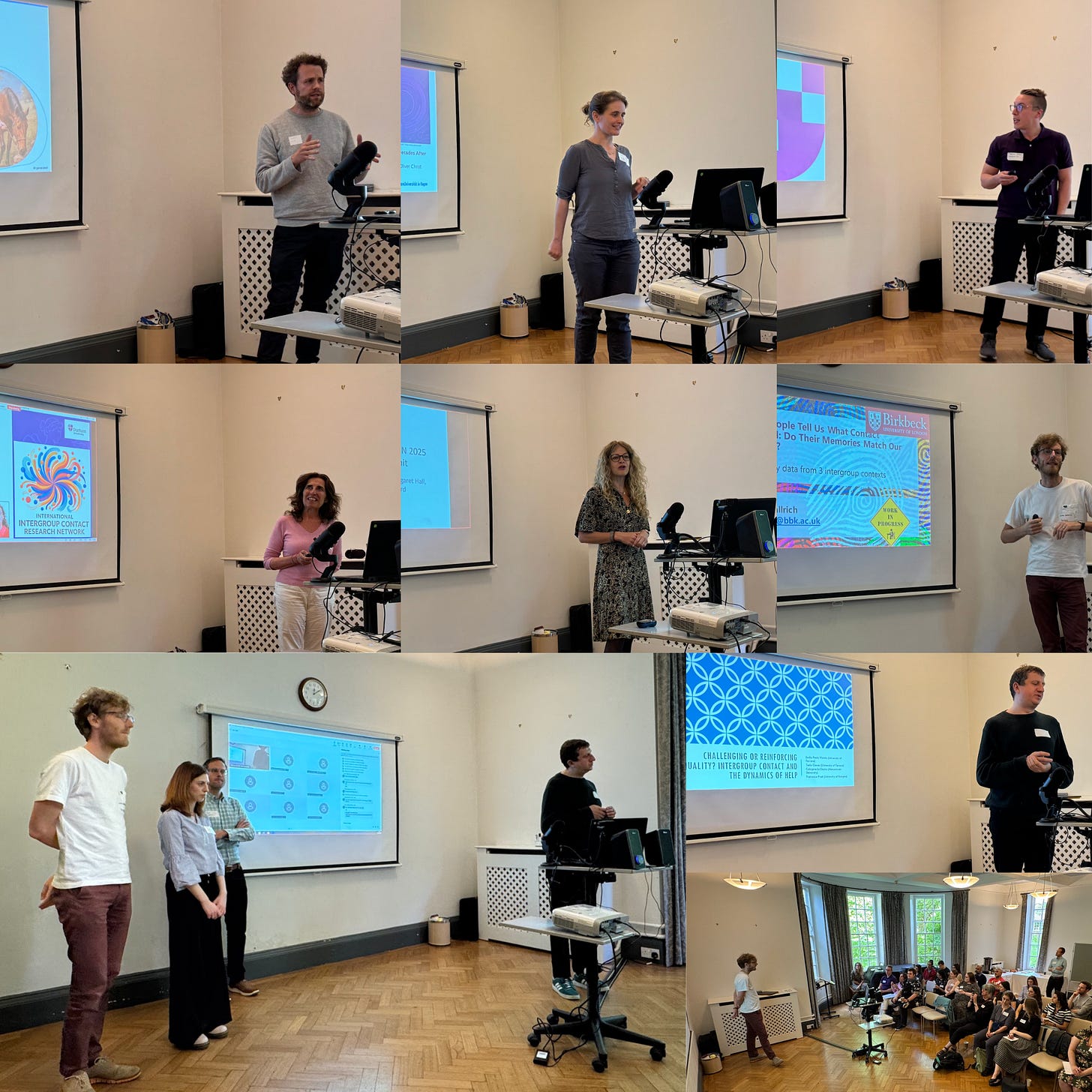Intergroup Contact Research Network News - July 2025
2nd Research Summit, Recent Advances and more ...
Welcome to the July 2025 Edition of the ICRN Newsletter!
We’re delighted to bring you the latest updates from the Intergroup Contact Research Network. This issue begins with highlights from our annual ICRN Summit, held in June at the University of Oxford—our once-a-year meeting that brings together members from across the globe to connect, collaborate, and shape the future of the network. A heartfelt thanks to all who joined us in person or online.
You’ll also find updates on the Contact Colloquium series and exciting news from our new podcast. Our first episode is live, and the second one is on the way! You’ll also find announcements about upcoming events and job opportunities, recent publications and accomplishments by our members, and a dedicated section on recent advances in intergroup contact research.
As our global community continues to grow, we’re glad to keep you connected through these termly newsletters. If you have suggestions or items to share in future editions, we’d love to hear from you.
Feel free to share this newsletter with colleagues who may be interested in joining our network.
Happy reading!
2025 ICRN Summit Recap
We had a fantastic day at this year’s ICRN Summit, held at the University of Oxford.
A huge thank you to Shelley McKeown Jones for hosting us, and to Stefania Paolini, who delivered a brilliant keynote address, with Sylvie Graf offering insightful reflections as discussant. The event featured 24 engaging presentations, as well as vibrant networking and idea exchange throughout the day.
Key highlights:
33 in-person and 23 online participants
A special session focused on shaping the ICRN’s vision, mission, and future activities – more updates coming soon!
Some sessions, including the keynote, were recorded and will be shared once finalised
We were also pleased to welcome Stefania Paolini as our new Chair. We warmly thank Michèle Denise Birtel for her dedicated leadership over the past year.
[from Stefania/for July Bulletin inclusion]. During the meeting, Stefania (Paolini), Lukas (Wallrich) and Rita (Guerra), in their roles as network chairs and secretary, suggested a blueprint for the ICRN network’s governance and constitution moving forward, anchored on the guiding principles of ‘diversity of people’. ‘diversity of ideas’, ‘respectful and equitable cooperation’, and ‘high ethical standards’. The Oxford’s meeting acted as a kickstart to the conversation about these themes and the future of the network, which we hope to progress with in the remainder of the year involving all members of the networks irrespective of their attendance or not of the last Summit. So watch this communication space and remain engaged in upcoming consultation efforts.
🎧 Contact Research Now: New Episode Out Now!
We recently launched Contact Research Now, our podcast exploring the latest insights in intergroup contact research. Hosted by Emine Bilgen and Lukas Wallrich, the podcast features conversations with leading scholars about their recent findings, theoretical developments, and real-world applications.
In our first episode, we spoke with Stefania Paolini, Sarina Schäfer, Giulia Rosa Policardo, and Jasper Van Assche about how positive and negative intergroup contact shape prejudice.
Our second episode, just released, takes a deep dive into VR and intergroup contact. We speak with Dr. Matilde Tassinari and Cassandra Crone about:
• Whether embodying a different avatar can truly build empathy
• When immersive experiences might backfire and increase bias
• How VR is being used to tackle real-world issues like hiring discrimination
• The future potential of VR for prejudice reduction
We learned a lot from both speakers and hope you enjoy the conversation too!
🔗 Listen Now: Substack, Apple Podcasts, Spotify, Youtube or Pocket Casts.
Contact Colloquium: Monthly Talks on Intergroup Contact
We’re excited to continue the Contact Colloquium, our monthly online event series featuring a speaker, a discussant, and opportunities for Q&A and broader discussion. The colloquium is open to all and held on Teams.ICRN members will automatically receive the calendar invites, while non-members can register for individual sessions via this link.
Here’s a look at our most recent sessions:
• Dr. Tinghua Yu (Birkbeck, University of London): Moral communalism, ingroup favouritism, and conditional altruism
• Dr. Julia Rohrer (University of Leipzig): Using causal graphs to reason more clearly about correlation and causation
• Prof. John Dixon (The Open University): The human geography of contact and desegregation – and why social psychologists should cultivate a spatial imagination
Slides, recordings, and information about upcoming sessions are available on the Contact Colloquium page. We hope to see you at an upcoming talk!
Upcoming Contact Colloquium
We’re currently planning the next series of the Contact Colloquium and would love your input!
Do you have a speaker or topic you’d like to see featured? Please let us know by filling out this short Google Form.
Your suggestions will help us shape a vibrant and diverse programme.
Recent Contact Publications by ICRN Members
ICRN members have continued to publish a wide range of exciting contact research. Below we highlight a few papers that caught our attention, to see more click here.
Afandiyev, Z. & Bilewicz, M. (2025). Mediated contact improves attitudes during an ongoing armed conflict: A study during the war between Armenia and Azerbaijan. Peace and Conflict: Journal of Peace Psychology https://doi.org/10.1037/pac0000786
Friehs, M.-T., Plaza Reveco, A., Schäfer, S. J., González, R., & Christ, O. (2025). Does intergroup contact affect political attitudes and behaviours? - A longitudinal test of tertiary transfer effects using the Chilean Longitudinal Social Survey (ELSOC). Journal of Community & Applied Social Psychology, 35(3), e70105. https://doi.org/10.1002/casp.70105
Friehs, M.-T., Schäfer, S. J., Wüst, K., Dürr, C., Böttcher, T., Resch G., Sander, B., Woltz, A., van Zalk, M. H. W., Bagci, S. C., Barlow, F. K., Bracegirdle, C., Cernat, V., Hässler, T., Jugert, P., Kotzur, P. F., Northcutt Bohmert, M., Swart, H., van Laar, C., Wagner, U., ... & Christ, O. (2025). What is the longitudinal evidence for causal intergroup contact effects? - A comparative multi-method re-analysis of 21 published studies. PsyArXiv Preprints. https://osf.io/vnhs7_v1
Puffer, H., & Hodson, G. (2025). Primary and secondary generalization effects from Black and gay contact: Longitudinal evidence of between- and within-person effects. British Journal of Social Psychology, 64(3), e12900. https://doi.org/10.1111/bjso.12900
Shulman, D., Crisp, R. J., Meleady, R. & Hodson, G. (2025). Cognitive Liberalisation Through a Different Lens: Intergroup Contact Attenuates the Relationship Between Intolerance of Uncertainty and Intergroup Bias Across Three Contexts. Journal of Community & Applied Social Psychology https://doi.org/10.1002/casp.70112
Blog posts
Birtel, M. D. & Tausch, N. (2025). From division to dialogue: How can we reduce Brexit-driven hostility? Research Communities by Springer Nature.
Other Recent Publications by ICRN Members (Not Contact-Specific)
To see more other publications by ICRN members, please click here.
Dupont, P. (2025). Anti-racism, multiculturalism and human rights: Reconceiving the politics of diversity in employment and education. Palgrave. https://link.springer.com/book/10.1007/978-3-031-87360-7.
If you’d like to highlight one of your recent publications in a future issue, please email us with the full citation (APA style preferred) and a link to the article or preprint. We aim to keep this section concise while showcasing a diverse range of member contributions.
Achievements by ICRN Members
Congratulations to Rita Guerra, who has been nominated for Fellow status in the Society for the Psychological Study of Social Issues (SPSSI). This recognition acknowledges her outstanding contributions to psychology and the study of social issues.
Congratulations to Patrick Kotzur for being promoted as Associate Professor at the University of Durham and Chloe Braciegirde for being offered a permanent faculty position at the Universiyt of Surrey. Great achievements!
Recent Advances in Contact Research
Summaries by Emine Bilgen.
Primary and Secondary Contact Effects: Can Contact with One Group Improve Attitudes Toward Others?
A recent longitudinal study by Puffer and Hodson takes a fresh look at a classic question in contact research: Does contact actually change people over time—or do we simply see stable differences between those who have more contact and those who don’t?
Using data collected over four timepoints, the study examines contact with two distinct groups (Black people and gay people) and how these interactions shape attitudes, humanisation, and collective action intentions. Crucially, the authors distinguish within-person changes (i.e., contact leading to real attitude shifts over time) from between-person differences (i.e., people with more contact already having more positive attitudes).
The findings offer solid evidence for both primary and secondary contact effects:
Primary contact (e.g., contact with Black people predicting better outcomes toward Black people) showed consistent effects across both within- and between-person levels.
Secondary contact (e.g., contact with one group improving views of another unrelated group) revealed an interesting asymmetry:
Black-to-gay effects were mostly within-person (i.e., contact predicted change).
Gay-to-Black effects were mainly between-person (i.e., more contact correlated with more positive views, but didn’t predict change).
Interestingly, contact frequency appeared to drive these effects more than contact quality in secondary generalisation. The results reinforce the potential of intergroup contact to foster not just better attitudes toward a single group, but broader openness across group boundaries.
Puffer, H. & Hodson, G. (2025). Primary and secondary generalization effects from Black and gay contact: Longitudinal evidence of between‐ and within‐person effects. British Journal of Social Psychology https://doi.org/10.1111/bjso.12900
Contact as a Path to Cognitive Flexibility: Reducing Bias Under Uncertainty
This large-scale study (N = 25,046) explored whether intergroup contact helps people rely less on bias when dealing with uncertainty. Drawing on Uncertainty-Identity Theory, the researchers found that individuals who had no contact with gay, transgender, or disabled people were more likely to show bias when they had high intolerance of uncertainty. However, this link was significantly weaker or absent among those who did have intergroup contact. The study introduces an important idea: contact doesn’t just reduce prejudice; it may also support broader psychological growth, such as cognitive flexibility.
Shulman, D., Crisp, R. J., Meleady, R. & Hodson, G. (2025). Cognitive Liberalisation Through a Different Lens: Intergroup Contact Attenuates the Relationship Between Intolerance of Uncertainty and Intergroup Bias Across Three Contexts. Journal of Community & Applied Social Psychology https://doi.org/10.1002/casp.70112
Do you have feedback on the newsletter, or anything you want to share? Email us: Emine Bilgen
Want to join the Network? Check our webpage





